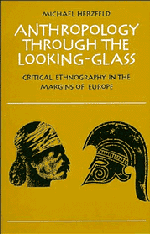Book contents
- Frontmatter
- Contents
- Preface
- Key to symbols
- 1 Romanticism and Hellenism: burdens of otherness
- 2 A secular cosmology
- 3 Aboriginal Europeans
- 4 Difference as identity
- 5 The double-headed eagle: self-knowledge and self-display
- 6 Strict definitions and bad habits
- 7 The practice of relativity
- 8 Etymologies of a discipline
- Notes
- Bibliography
- Index
1 - Romanticism and Hellenism: burdens of otherness
Published online by Cambridge University Press: 11 March 2010
- Frontmatter
- Contents
- Preface
- Key to symbols
- 1 Romanticism and Hellenism: burdens of otherness
- 2 A secular cosmology
- 3 Aboriginal Europeans
- 4 Difference as identity
- 5 The double-headed eagle: self-knowledge and self-display
- 6 Strict definitions and bad habits
- 7 The practice of relativity
- 8 Etymologies of a discipline
- Notes
- Bibliography
- Index
Summary
The dilemmas of marginal identity: anthropology as ethnographic object
Ancient Greece is the idealized spiritual and intellectual ancestor of Europe. Anthropology, the study of humankind that emerged from the heyday of European dominance, has nevertheless found disproportionately little theoretical use for the Greece of today. This is all the more noteworthy in that anthropologists have worked productively in contemporary Greek communities, and because issues in the development of anthropological theory closely and instructively parallel ideological conflicts in modern Greece. A curious silence enfolds the connections between modern Greek culture and the practice of anthropology.
Probing that silence is an investigation of anthropology and its assumptions. More specifically, the labile boundary between the exotic and the familiar in Greek ethnography illuminates the problem of exoticism in anthropological thinking generally. The present project is political as well as epistemological; ethnographic as well as anthropological; and descriptive as well as analytical. Indeed, these are not mutually exclusive or radically polar opposites, any more than are modern anthropological theory and the ethnographic study of modern Greece, although such pairs may have been so treated in the past.
The task is a comparative one. The poles of the comparison are, respectively, the culture of modern Greece, and the discourse of anthropology. By taking as its touchstone a society that brings together the stereotypes of the exotic and the European, this approach highlights the symbolic character of anthropology as the exploration and expression, not of exotic societies, but on the contrary of the cultural identities of those globally dominant societies that themselves created the discipline. It will thus allow us to explore the relationship between theory and the cultural practices in which it is embedded.
- Type
- Chapter
- Information
- Anthropology through the Looking-GlassCritical Ethnography in the Margins of Europe, pp. 1 - 27Publisher: Cambridge University PressPrint publication year: 1988



